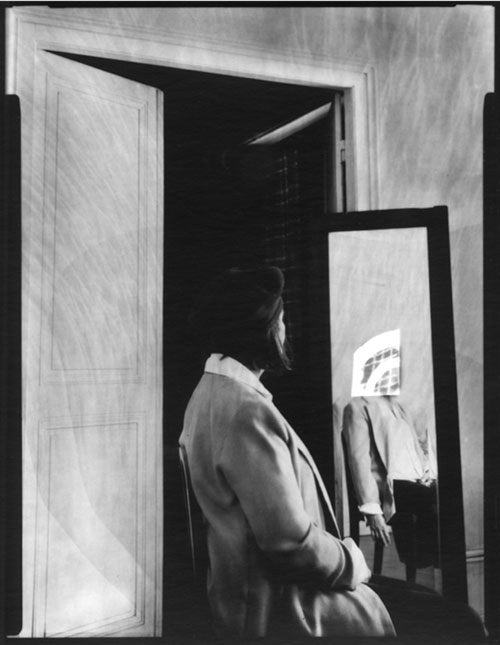Sara Imloul has developed since 2008 a practice focused on symbolic and autobiographical photography, staging her contrasting black-and-white images born out of inner visions and memories.
*Since her studies at the ETPA in Toulouse, Imloul has been using calotype, a process developed by Henri Fox Talbot in 1840 that allows a contact print to be made from a paper negative. Imloul edits each negative by hand, mixing drawings and collages with her photographic prints, manually composing her own unique story.
*Contrary to digital manipulation, and instead of returning to the medium’s origins, Imloul’s black-and-white images are conceived as true theatrical pictures, seemingly straight out of the 19th century. Imloul has chosen slowness, the Arte Povera of photography.
For her first exhibition at Hopstreet Gallery, Sara Imloul focuses on the series Das Schloss (2014), complemented by a number of photographs from the series Négatifs (2012) and Chez Moi (2020-2021).
In Imloul’s second series, Négatifs (2012), the small size of the calotypes is striking, but so is their special finesse. Imloul exposed the paper directly in her 4×5-inch camera, creating unique negative images on baryta paper.
*The series Das Schloss (2014), which takes its name from the family home in Lorraine, takes this investigation even further. It organises a photographic in-camera session with her nearest and dearest and her ancestors. In order to better tell the story of this place through traces and small touches, Imloul arranges intimate sketches in front of her imposing room. They are based on the model of a family constellation, a term borrowed from group therapy that aims to solve family problems by exchanging roles. A reflection on identity and the introspective dimension is at work here, with the expression of the “I” operating through play. Role-playing, mask-playing and staging games are thus brought together by the magic of photography. And the photographer invests in the tenuous gap that separates reconstitution and recollection, reality and representation. ImIouI conjures up an apparition, revealing an evanescent image that is expressed like a reminiscence. Such a practice is based on questioning the medium’s indexical power, which is capable of materialising thought and generating the fictional repetition of past events.
Chez Moi is a series that Imloul conceived during the lockdown and realised entirely in her Parisian flat. Following in the footsteps of the Dadaists, whom she regards as her predecessors, she uses the collage technique. Images of alligators, gazelles and pelicans are integrated into the works. She lovingly refers to them as her “innocent children”. After all, animals are victims of an increasingly guilty world that cuts us off from beauty and life. Violent reality is never far away; the photographs can only sublimate it.
*Conveying a theatrical sense of composition, these detailed scenography’s, props and sets are arranged with a surveyor’s precision. They require meticulous preparation, built around texts and sketches. The exposure times are long, with no room left for improvisation. lmloul is, above all, looking for an image as close as possible to the threshold of her imagination. Having become pure plastic elements, the people close to her, whom she uses as models, adopt fixed attitudes and sometimes even emphatic gestures. The faces are hidden, the monstration of the bodies fragmented, the metonymy moving them into a blurred register with no vanishing point. Underlying enigma and latent tension are sovereign, designating a photograph experienced as a labyrinthine space where loss is combined with discovery.
Sara Imloul (b. 1986) lives and works in Paris and was awarded the Levallois Prize in 2019 for the series Passages, de L’Ombre aux Images (2015-2018).
She has published two monographs with Éditions Filigranes: Passages in 2022 and Das Schloss in 2014.
Her work was exhibited at the Manuel Riviera-Ortiz Foundation in a duo show with Elina Brotherus during the Rencontres de la Photographie d’Arles 2022.

